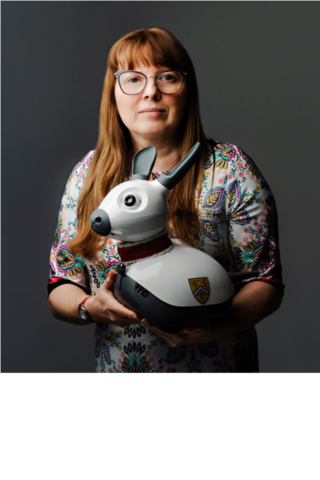In the field of Control, Robotics, and Autonomous Systems, we focus on ensuring that physical systems perform as desired through the application of advanced feedback control techniques. A prime example is the autopilot system in aircraft, which continuously adjusts to maintain optimal speed, altitude, and direction. At its core, feedback control is a fundamental concept in engineering, empowering systems to achieve peak performance and reliability.
Control systems are essential to modern industries, from automated manufacturing and robotics to aerospace and chemical processing. As our world becomes increasingly digital, the role of control systems continues to expand, driving innovation across diverse sectors.
Our research in Control, Robotics, and Autonomous Systems spans a wide range of topics, including linear and nonlinear control, networked and distributed control, adaptive and robust control, autonomous systems, stochastic algorithms, and discrete event systems. These principles fuel groundbreaking applications in robotics, smart power grids, computer networks, autonomous vehicles, multi-agent systems, environmental monitoring, transportation networks, and even psychological systems.
With a solid foundation in advanced mathematics, graduate students in Control, Robotics, and Autonomous Systems develop expertise in both the design and implementation of control systems while honing their critical analysis and problem-solving skills. This blend of technical mastery and analytical insight positions our graduates to lead and innovate in a rapidly advancing technological landscape.
Faculty members participating in control, robotics, and autonomous systems research:
Kerstin Dautenhahn

Biography
Dr. Kerstin Dautenhahn is a professor in the Department of Electrical and Computer Engineering at the University of Waterloo. She is a Tier 2 Canada Research Chair in Socially Intelligent Robotics. Previously she held a Canada 150 Research Chair in Intelligent Robotics. Dr. Dautenhahn is cross-appointed to the David R. Cheriton School of Computer Science, the Department of Mechanical and Mechatronics Engineering, and the Department of Systems Design Engineering at the University of Waterloo. She is a visiting professor at the University of Hertfordshire, UK. At Waterloo, she is the Director of the Social and Intelligent Robotics Research Laboratory (SIRRL).
The main areas of her research are human-robot interaction, social robotics, assistive technology, and health technologies. She is editor-in-chief (jointly with Prof. Angelo Cangelosi of the University of Manchester, UK) of the Journal Interaction Studies — Social Behaviour and Communication in Biological and Artificial Systems, published by John Benjamins Publishing Company, editorial board member of Adaptive Behavior, Sage Publications, associate editor of the International Journal of Social Robotics, published by Springer, and associate editor of IEEE Transactions on Cognitive and Developmental Systems. She is an editor of the book series Advances in Interaction Studies, published by John Benjamins Publishing Company. Dr. Dautenhahn is on the Advisory Board of the journal AI and Society (Springer). She is a Fellow of the Royal Society of Canada (RSC), a Fellow of the IEEE, a member of the ACM, and a Lifelong Fellow of AISB, as well as a member of the Executive Board of the International Foundation for Responsible Robotics. Since 2006, she has been part of the Standing Steering Committee of the IEEE conference RO-MAN (Human and Robot Interactive Communication).
Research interests
- Human-Robot Interaction
- Social Robotics
- Robot-Assisted Therapy
- Robot-Mediated Instruction
- Assistive Robotics
- Artificial Intelligence
- Artificial Life
Dan Davison

Biography
Dr. Dan Davison is an associate professor in the Department of Electrical and Computer Engineering at the University of Waterloo.
His research interests include theoretical control, which involves various aspects of linear and nonlinear control, including performance limitations in feedback control, multi-agent control schemes, and time-delay systems.
Dr. Davison is also interested in applied control in areas such as psychological systems with rich dynamics. Current projects include stabilization of crowds governed by notions of suggestibility, the modelling of cognitive dissonance, and the study of social psychological systems in which a person is influencing others to change their attitude. His approach to research is that he allows applications to motivate the discovery of theories instead of the other way around, which reduces the need to force the finding of applications for theories. He has written various papers about control theory and its applications.
Research interests
- linear and nonlinear control
- control systems with time delays
- multi-agent control schemes
- psychological system with interesting dynamics
- engine control
- aircraft control
- Mechatronics & Controls
Roya Firoozi

Biography
Dr. Roya Firoozi is an assistant professor in the Department of Electrical and Computer Engineering at the University of Waterloo. Prior to this role, she was a postdoctoral researcher at Stanford University’s Multi-Robot Systems Laboratory. Dr. Firoozi holds a bachelor's degree in mechanical engineering and a Ph.D. in control theory, with minors in optimization and machine learning, from the University of California, Berkeley. Her research lies at the intersection of robotics, artificial intelligence, and control theory, with a focus on enabling safe robot autonomy in interactive, open-world environments.
Research interests
- Robotics aided by generative AI
- Multi-modal perception and planning
- Interactive autonomy in multi-agent systems
- Game theory and distributed optimization for multi-agent interactions
- Safe robot autonomy
Michael Fisher

Biography
Dr. Michael Fisher is an Assistant Professor in the Department of Electrical and Computer Engineering at the University of Waterloo. His research is centered around dynamics, optimization, and control of complex systems. He received his PhD in electrical engineering: systems at the University of Michigan, Ann Arbor in 2020, and a MSc. in mathematics from the same university in 2017. Prior to joining Waterloo he was a postdoctoral researcher with the Automatic Control Laboratory and the Power System Laboratory at ETH Zurich from 2020-2022. He was a finalist for the 2017 Conference on Decision and Control (CDC) Best Student Paper Award, and a recipient of the 2019 CDC Outstanding Student Paper Award.
Research interests
- Optimal control
- Distributed control
- Ensemble control
- Nonlinear stability
- Hybrid dynamics
- Nonlinear control
- Complex systems
- Power systems
- Power electronics
Chrystopher Nehaniv

Biography
Dr. Chrystopher Nehaniv is a full professor in the Departments of Systems Design Engineering and Electrical and Computer Engineering at the University of Waterloo, a position he has held since August 2018. A mathematician, computer scientist, and complex adaptive systems researcher, Dr. Nehaniv is also affiliated with the University of Hertfordshire in the United Kingdom, where he previously served as Director of the Centre for Computer Science & Informatics Research. There, he led research in the Algorithms, Adaptive Systems, and Wolfson Royal Society Biocomputation Research Groups as a professor of mathematical and evolutionary computer sciences.
Before moving to Canada, Dr. Nehaniv was a full professor at the University of Aizu in Japan and held visiting professorships in mathematics at Ibaraki National University, Japan, and the Institute for Mathematics & Informatics at the University of Debrecen, Hungary. He was also a postdoctoral research fellow and lecturer in mathematics at the University of California, Berkeley.
Dr. Nehaniv is the founder of the Waterloo Algebraic Intelligence & Computation Laboratory (WAICL) and, alongside Dr. Kerstin Dautenhahn, co-founded the University of Waterloo's Social and Intelligent Robotics Research Laboratory (SIRRL). He is a member of the Waterloo AI Institute and serves on the steering committee of the Waterloo Institute for Complexity and Innovation (WICI).
An active contributor to the academic community, Dr. Nehaniv is an associate editor for BioSystems, IEEE Transactions on Cognitive and Developmental Systems, Interaction Studies, and Complexity. He previously served as topic editor-in-chief for The International Journal of Advanced Robotic Systems in the areas of AI robotics and human-machine/robot interaction. He has been involved with the IEEE Task Force for Artificial Life and Complex Adaptive Systems since its inception in 2003, serving as Chair from 2012 to 2018 and as Vice Chair since 2018. He is also a member of the IEEE Cognitive and Developmental Systems Technical Committee (2019-present) of the IEEE Computational Intelligence Society.
Research interests
- Algebraic Methods in Algorithms & Applications
- Artificial Intelligence
- Artificial Life & Complex Adaptive Systems
- Algebra & Discrete-Event Dynamical Systems:
- Automata, Permutation Groups, Transformation Semigroups, Interaction Machines, Models of Time
- Systems Biology & Neuroscience: Mathematical & Computational Methods
- Gene-Regulatory Networks & Differentiated Multicellularity
- Interactive Systems Design
- Cognitive Architectures for AI Robotics
- Enactive Experiential & Temporally Extended Intelligence
- Evolvability
- Cognitive\/Social\/ Skill & Linguistic Development in Animals & Artifacts
- Dynamic Networks
- Whole-Part Relations\/Natural Subsystems
- Global Hierarchical Coordinate Systems for Understanding\/Prediction\/Manipulation in STEM
Christopher Nielsen

Biography
Dr. Christopher Nielsen is a professor in the Department of Electrical and Computer Engineering and associate dean of graduate studies and postdoctoral affairs in the Faculty of Engineering at the University of Waterloo.
Dr. Nielsen’s research focuses on nonlinear control systems, motion control for nonlinear systems, methods for stabilizing sets in the state space of a system, output feedback control, geometric control, and Computer-Aided Design (CAD) for nonlinear controllers. His research is supported by the Natural Sciences and Engineering Research Council of Canada.
Dr. Nielsen has authored or co-authored numerous journal articles published in prestigious journals, including IEEE Transactions on Automatic Control, Automatica, and the SIAM Journal on Control and Optimization, among others.
Research interests
- Nonlinear control systems
- Motion control
- Geometric control
- Multi-agent systems
- Mechatronics & Control
- Advanced robotics
- Controls and precision tooling
- Autonomous vehicles
Gennaro Notomista

Biography
Dr. Gennaro Notomista is an assistant professor in the Department of Electrical and Computer Engineering at the University of Waterloo, where he leads the Ecological and Resilient Autonomous roBots Lab. Prior to joining Waterloo, he was a postdoctoral researcher at the CNRS/Inria/IRISA, Rennes, France. His main research interests lie at the intersection of design and control of robotic systems for long-duration autonomy with applications to environmental monitoring.
He received a B.S. degree in mechanical engineering from the Università degli Studi di Napoli “Federico II,” Napoli, Italy, in 2012; an M.Eng. degree in automotive engineering from the Technische Hochschule Ingolstadt, Ingolstadt, Germany, in 2015; an M.S. degree in mechanical engineering from the Università degli Studi di Napoli “Federico II,” Napoli, Italy, in 2016; and an M.S. degree in mathematics and a Ph.D. degree in robotics from the Georgia Institute of Technology, Atlanta, GA, USA, in 2019 and 2020, respectively.
Dr. Notomista is a Fulbright Scholar and was the recipient of the Alumni Small Grant (2020) and the IEEE ARSO Best Paper Award (2022). He is an IEEE member, associate editor of the IEEE Robotics and Automation Letters, and guest associate editor of Autonomous Robots.
Research interests
- Robot design and control for long-duration autonomy
- Resilient heterogeneous multi-robot systems
- Human-multi-robot interaction
- Optimization-based control design
- Safety of dynamical systems
Yash Vardhan Pant

Biography
Dr. Yash Vardhan Pant is an assistant professor in the Department of Electrical and Computer Engineering at the University of Waterloo, where he leads the Control, Learning and Logic (CL2) Group. His research focuses on developing robust and reliable autonomous systems, drawing on control theory, formal methods, machine learning, and optimization.
Dr. Pant earned his Ph.D. in Electrical Engineering from the University of Pennsylvania in 2019, where he received the Richard K. Dentel Memorial Award for research in urban transportation. Prior to joining the University of Waterloo in July 2021, he was a postdoctoral fellow at the Department of Electrical Engineering and Computer Sciences at the University of California, Berkeley.
Research interests
- Autonomous Systems
- Cyber-Physical Systems
- Control Theory
- Formal Methods
- Optimization
- Machine Learning
- Multi-Robot Systems
- Intelligent Transportation Systems
Stephen L. Smith

Biography
Dr. Stephen L. Smith is a professor in electrical and computer engineering at the University of Waterloo, the Canada Research Chair in Autonomous Systems, and the director of the Autonomous Systems Laboratory. He is a licensed Professional Engineer (PEng) by the Professional Engineers Ontario and is a Senior Member of the IEEE. He is currently an associate editor for the IEEE Transactions on Control of Network Systems and the co-chair of the 30th IEEE International Conference on Robot & Human Interactive Communication (RO-MAN 2021). Previously, he was a postdoctoral researcher in the Computer Science & Artificial Intelligence Lab at MIT.
Dr. Smith's research group focuses on control, learning, and optimization for autonomous systems and robotics. Through this research, he collaborates with several industrial partners in robotics and transportation systems and has designed control, optimization, and autonomy for improving efficiency in applications including future urban mobility systems, underwater ocean monitoring, and industrial robotic cleaning.
Research interests
- Autonomous systems
- Robotics
- Artificial intelligence
- Human-robot interaction
- Multi-robot systems
- Machine learning
- Control theory
- Distributed and coordinated control
- Optimization
- Autonomous vehicles
- Intelligent transportation systems
John Thistle
Biography
Dr. John Thistle is an Associate Professor in the Department of Electrical and Computer Engineering at the University of Waterloo. He is a member of the Waterloo Formal Methods (WatForm) research group, which focuses on applying formal methods to hardware design and software engineering.
Dr. Thistle’s research interests include the control of discrete event systems, as well as the formal synthesis and verification of such systems, and applications to software development. He is particularly focused on the decidability and complexity of synthesizing both centralized and distributed controllers. His work has applications in traditional control engineering as well as in the design of distributed software systems.
Research interests
- Control of Discrete Event Systems
- Formal Synthesis and Verification of Discrete Event Systems
- Software Development
- Communication & Information Systems
- Cybersecurity
- Infrastructure Integrity
Adjunct faculty members participating in control, robotics, and autonomous systems research:
Dwight Aplevich (Adjunct)

Biography
Dr. J. Dwight Aplevich received his B.E. degree in Electrical Engineering Science from the University of Saskatchewan, Saskatoon, Canada, in 1964, and his PhD in Communications and Electronics from Imperial College, London, U.K., in 1968. He is currently a Professor Emeritus at the University of Waterloo where he previously served as a professor of electrical and computer engineering.
Dr. Aplevich held extended visiting positions at several prestigious institutions, including Imperial College London, Université Paul Sabatier Toulouse, Lund University, École Polytechnique de Montréal, the University of Texas at Arlington, and the Vancouver Innovation Centre of the National Research Council. His research interests focus on the theory of implicit system models, system identification, computational aspects of control theory, and their applications.
Dr. Aplevich is a Registered Professional Engineer in the province of Ontario.
Andrew Heunis (Adjunct)

Biography
Dr. Andrew Heunis is a Professor Emeritus in the Department of Electrical and Computer Engineering at the University of Waterloo.
Dr. Heunis has research interests in stochastic algorithms, system identification, nonlinear filtering and stochastic differential equations. He has published journals with the Society for Industrial and Applied Mathematics and IEEE, as well as various PDF texts.
Research interests
- Communication Systems
- Information Systems
- Stochastic algorithms
- System identification
- Nonlinear filtering
- Stochastic differential equations
Daniel Miller (Adjunct)

Biography
Daniel Miller is a Professor Emeritus in the Department of Electrical and Computer Engineering at the University of Waterloo.
His research interests lie in the areas of adaptive control, decentralized control, and control with delays. His research is funded by the Natural Sciences and Engineering Research Council of Canada. His work has appeared in such journals as the IEEE Transactions of Automatic Control and the Mathematics of Control, Signals and Systems. He recently co-authored a book on decentralized control.
Research interests
- Adaptive Control
- Decentralized Control
- Control with Delays
John Simpson-Porco (Adjunct)

Biography
Dr. John W. Simpson-Porco received his B.Sc. in Engineering Physics from Queen's University in Kingston, ON, Canada, in 2010, and his Ph.D. in Mechanical Engineering from the University of California, Santa Barbara, USA, in 2015. He is currently an Adjunct Assistant Professor in the Department of Electrical and Computer Engineering at the University of Waterloo, ON, Canada. Previously, he was a visiting scientist with the Automatic Control Laboratory at ETH Zurich, Switzerland.
Dr. Simpson-Porco’s research focuses on the control and optimization of multi-agent systems and networks, with a particular emphasis on applications in modernized power grids. He is the recipient of several prestigious awards, including the 2012–2014 IFAC Automatica Prize, the Center for Control, Dynamical Systems, and Computation Best Thesis Award, and the Outstanding Scholar Fellowship.
Research interests
- Distributed control systems
- Decentralized control systems
- Optimal control
- Smart Grid
- Microgrids
- Frequency Control
- Voltage Control